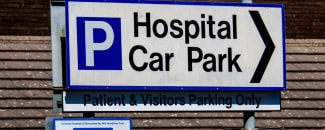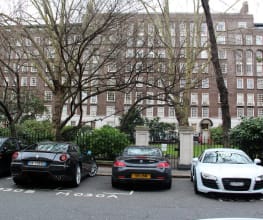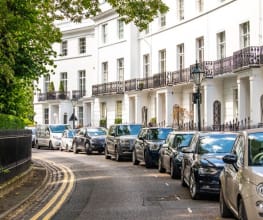Real time data to improve parking
Better parking and traffic management could eliminate those frustrating situations where you can’t find a convenient, available parking space. Real time data can be gathered about when and where parking spaces are in use. This can be done by small sensors that are installed in the parking spot. The sensors are long lasting and can communicate over long ranges. These sensors can then transmit data to a smartphone app, showing whether the space is in use in real time. Drivers can then use the smartphone app to search for parking spaces that are available within a convenient radius.
Dynamic pricing
This real time data could also help with planning parking spaces. Where there is excessive demand for parking in an area, a council may consider a project to create additional spaces. Conversely, if there are parking spaces that are hardly ever used, it may be more beneficial to put the land to some other use. This also links in with dynamic pricing. With dynamic pricing, parking charges can be raised and lowered in real time, dependent on demand. For more information about dynamic parking charges, take a look at our article: The benefits of dynamic pricing for parking.
A smarter payment system
Car parks are one of the only areas of our lives where the main method of payment is by coins. Even many bus companies now accept payment by card. The future of parking is highly likely to involve some form of smarter payment system. This is already being implemented in car parks across the county, with companies such as RingGo. Drivers can pay via mobile phone app or by making a call on their phone. Cashless payment methods for parking is far more convenient than having to search in your pockets for the correct change to feed the parking meter. Cashless payment methods also allow drivers to top up their parking time, via mobile app or telephone, without having to physically return to the car park ticket machine. This is a great option if you have an important meeting that is running on for longer than anticipated. For more information, check out our article: Why every car park should offer a cashless payment option.
Pre booking will become more popular
Pre booking car parking spaces is likely to become more popular. This can be done by online reservations and guarantees that there will be a space waiting for you when you arrive. YourParkingSpace offers the facility to book a parking space in advance using our quick and simple online platform. You can even book a space on the go by using our free smartphone app.
The rise of off-street parking
On street parking could well become a thing of the past. Crowded streets are an eyesore and risk cars being scratched or scraped as drivers try to squeeze into ever diminishing spaces. There is plenty of off-street parking space available in most places. However, if drivers are not aware of where these off-street parking spaces are or how to access them, then they tend to prefer not to have to search for them and will choose the easier option of on street parking. YourParkingSpace makes it easy for motorists to book convenient and affordable off-street parking spaces. Avoid the hassle of trawling around side streets looking for an available parking space and cruise straight into the perfect pre-booked spot.
Shared vehicles and parking
Shared vehicle schemes are rising in popularity around the UK. These schemes are changing the way the ownership of vehicles is perceived. Often shared vehicle schemes, such as Zipcar, have designated parking spaces for their fleet of vehicles. These parking spaces cannot be used by other cars. They are located at various points around cities and elsewhere, with the aim that everyone should find a car available to use in close proximity to their home or workplace. To read more about some of the shared vehicle schemes that are available, have a look at our article: Hiyacar v Uber v Zipcar.
More charging points for electric vehicles
Electric vehicles are becoming a common sight in car parks across the country. Electric vehicles are beneficial for the environment, so drivers are encouraged to make the switch if they can. There are already 7000 charging points available in the UK. Most of these are free to use to charge your car. If electric vehicles become the norm, then car parks and parking areas will need to take account of this and ensure that there are adequate charging points available for people to use while their car is parked
Autonomous vehicles and parking
One of the biggest changes that is coming to the parking sector sounds as though it is straight from the realms of science fiction. Autonomous vehicles are likely to be seen on our roads in the not too distant future. With driverless cars, it may not be people parking, but the cars parking themselves. To some extent, this technology is already widely used with many cars being equipped with sensors to assist drivers to park more easily. This is particularly useful in tight spaces.
Autonomous vehicle parking would allow for better utilization of space. We could even see developments where robots are parking our cars for us. One example of this has already been trialled at airports in Paris and Lyon. Drivers simply left their cars in a specially designed garage by the terminal entrance. Once the drivers had left, a robot known as ‘Stanley’ took over. Stanley is a sort of pallet truck which lifts the vehicles up and moves them around an open-air car park. It deposits the cars in tightly packed blocks, making the best use of space. Stanley links each car to the passenger’s air ticket so when their flight is about to land, it collects their vehicle and returns it to the garage, ready for the driver to collect it and drive away. This system saves time for the passengers as well as increasing car parking capacity for the airport. Drivers also reported a preference for collecting their vehicle from a well-lit ground floor garage, rather than having to walk into a gloomy underground car park late at night or climb endless stairs to reach the floor their vehicle was on.
The use of autonomous vehicles could mean that there is less need for parking spaces in the future. If cars don’t require a driver, they could spend the day travelling around, dropping off one passenger and immediately setting off to pick up the next. This would eliminate the need for many parking spaces during the day. Of course, the cars would still need somewhere to park when they were not in use or when they were being repaired or maintained.
One option would be for them to be parked in large off street car parks, located away from the main city streets and residential areas. While this would keep streets clear of parked cars, there are also some disadvantages to this approach. There would be periods of high demand, such as during rush hour, when many passengers would require a car, but these would not last all day. This means that there are likely to be cars with no passengers at quieter times of the day. They would either need somewhere to park or would be adding unnecessarily to pollution by driving around without passengers. Another disadvantage of having cars parked away from cities and residential areas would be the time that people would have to wait for the car to arrive. If people are going to change from having a private vehicle to using a shared autonomous vehicle, they would have to be sure that it would be convenient and available whenever they needed it. This would be a particularly relevant point for unexpected journeys, such as trips to the hospital or last-minute business excursions.
This has been a sneak preview into what the future of parking may hold for us in the future. Real time data on available spaces, electric vehicles, dynamic pricing, and even autonomous cars are all possibilities that are gradually being realised. In the meantime, ensure that all your parking needs are met by booking with YourParkingSpace. Book in advance to make sure that there is a convenient and affordable space waiting for you when you arrive. No need to worry about congestion or wasted time spent seeking out a parking spot. Simply cruise straight into your space and head out to enjoy your day.








